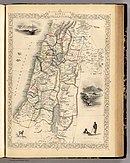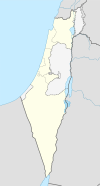| Revision as of 22:04, 16 October 2012 editGreyshark09 (talk | contribs)Extended confirmed users, Pending changes reviewers42,564 edits →Palestine as the region of the Palestinian territories← Previous edit | Revision as of 22:20, 16 October 2012 edit undoGreyshark09 (talk | contribs)Extended confirmed users, Pending changes reviewers42,564 editsNo edit summaryNext edit → | ||
| Line 3: | Line 3: | ||
| The term ''']''' has several overlapping (and occasionally contradictory) definitions. | The term ''']''' has several overlapping (and occasionally contradictory) definitions. | ||
| ==Palestine |
==Palestine and Philistia== | ||
| {{main|Philistia}} | |||
| Palestine originates from the Greek "Palaestina", a geographic definition of an area within Levant, which exact border are not precisely defined in historic writings. Though some writings in Greek mention the term before common era, there is a possibility that the term was inserted in early Middle Ages, upon rewriting early works of historians such as Herodotus (original writings didn't survive). The term in Greek is generally considered to originate from Canaanite Pentapolis of Philistia (including Gaza, Ashkelon, Gath, Ekron and Ashdod), which existed on the Mediterranean coastline of Southern Levant during the Late Bronze and early Iron Age. | |||
| ⚫ | ==Palestine as a geopolitical definition== | ||
| {{see|Time periods in the region of Palestine|History of Palestine|History of the name Palestine}} | {{see|Time periods in the region of Palestine|History of Palestine|History of the name Palestine}} | ||
| ] showing Israel's 1948 and 1967 borders]] | ] showing Israel's 1948 and 1967 borders]] | ||
| Line 9: | Line 13: | ||
| In historical contexts predating the ], ''Palestine'' was mostly a ]al term, particularly used in the ] ] and ], and also other languages taking their geographical vocabulary from them. The Romans united ] with the ] to form the ] of ] (encapsulating territories of ancient ], ], ], ], ], and ]) and thus included much of the land on both sides of the ] although with further political sub-divisions along the Jordan River valley. | In historical contexts predating the ], ''Palestine'' was mostly a ]al term, particularly used in the ] ] and ], and also other languages taking their geographical vocabulary from them. The Romans united ] with the ] to form the ] of ] (encapsulating territories of ancient ], ], ], ], ], and ]) and thus included much of the land on both sides of the ] although with further political sub-divisions along the Jordan River valley. | ||
| ==Palestine as a geographic term== | |||
| In ]al contexts, "Palestine" is often used, as it is a distinctly unique natural unit. Rivers, vegetation and ] have ignored political boundaries, while contributing to the development of the natural character of the land. Today, Palestine's borders as a region are defined by the borders of Mandatory Palestine. | |||
| In colloquial everyday usage member-states of the Arab League continue using the name for the entire region of Historic Palestine (as defined by the boundaries of Mandatory Palestine). | |||
| ⚫ | ==Palestine as |
||
| ⚫ | {{main|Palestinian Authority|Palestinian territories}} | ||
| ⚫ | ] (] and ]) showing Israel's 1948 and 1967 borders]] | ||
| ⚫ | ] showing Israel's 1948 and 1967 borders]] | ||
| Sometimes people use the term ''Palestine'' in a limited sense to refer to lands currently under the administrative control of the ], a quasi-governmental entity which governs but lacks full sovereignty. Since the late 1990s, this has included the ] and most of the ]. However in colloquial everyday usage residents of all parts of Palestine continue using the name for the entire region of Historic Palestine (as defined before the creation of the State of Israel). Palestinian citizens of Israel (who are officially referred to by Israel as "Israeli Arabs") generally make a distinction between the land (Palestine) and the political structures governing it (Israel, Palestinian Authority). Thus, many Palestinians in Israel, the Occupied Territories and in dispersion use the word "Palestine" to refer to Historic Palestine, even when they recognize Israel's existence and affirm its right to continue to exist; for such people, Palestine and Israel are one and the same territory. | |||
| ==Palestine as a state== | ==Palestine as a state== | ||
| {{Main|Views of Palestinian statehood}} | {{Main|State of Palestine|Views of Palestinian statehood}} | ||
| Modern usage of the term |
Modern usage of the term Palestine often refers to a prospective ], incorporating both the ] and the ]. Some who oppose the existence of a ] in the region regard all the land west of the ] as the territory of a possible Palestinian Arab state "from the river to the sea," in denial of Israel's existence or right to exist in the future. | ||
| The term is also used to convey the sense that Palestine is ''already'' a state, either (a) consisting only of Gaza & West Bank or (b) including as well all land held by Israel. Since the 1988 ], the UN General Assembly has recognized the PLO mission there under the name "Palestine."<ref name=Suy>{{cite book|title=''International Law: Theory and Practice : Essays in Honour of Eric Suy''|author=Eric Suy, Karel Wellens|year=1998|page=378|publisher=Martinus Nijhoff|isbn=90-411-0582-4|url=http://books.google.com/?id=Nv6CuZ-AcoYC&pg=PA377&dq=palestinian+right+of+return+subject:%22law%22}}</ref> | The term is also used to convey the sense that Palestine is ''already'' a state, either (a) consisting only of Gaza & West Bank or (b) including as well all land held by Israel. Since the 1988 ], the UN General Assembly has recognized the PLO mission there under the name "Palestine."<ref name=Suy>{{cite book|title=''International Law: Theory and Practice : Essays in Honour of Eric Suy''|author=Eric Suy, Karel Wellens|year=1998|page=378|publisher=Martinus Nijhoff|isbn=90-411-0582-4|url=http://books.google.com/?id=Nv6CuZ-AcoYC&pg=PA377&dq=palestinian+right+of+return+subject:%22law%22}}</ref> | ||
| ==Palestine as the Palestinian Authority== | |||
| ⚫ | {{main|Palestinian Authority|Palestinian territories}} | ||
| ⚫ | ] (] and ]) showing Israel's 1948 and 1967 borders]] | ||
| ⚫ | ] showing Israel's 1948 and 1967 borders]] | ||
| Sometimes people use the term ''Palestine'' in a limited sense to refer to lands currently under the factual administrative control of the ], a quasi-governmental entity which governs an autonomy, but lacks full sovereignty. Since the late 1990s, this has included the ] and most of the ]. Since 2007, however, the Palestinian Authority lost control of the Gaza Strip to Hamas, retaining its control of significant portion of the West Bank. | |||
| ==See also== | ==See also== | ||
| *] | *] | ||
| *] | *] | ||
| *] | |||
| *] | *] | ||
| *] | *] | ||
| *] | *] | ||
| *] | *] | ||
| *] | |||
| ==References== | ==References== | ||
Revision as of 22:20, 16 October 2012
Further information: History of the name Palestine
The term Palestine has several overlapping (and occasionally contradictory) definitions.
Palestine and Philistia
Main article: PhilistiaPalestine originates from the Greek "Palaestina", a geographic definition of an area within Levant, which exact border are not precisely defined in historic writings. Though some writings in Greek mention the term before common era, there is a possibility that the term was inserted in early Middle Ages, upon rewriting early works of historians such as Herodotus (original writings didn't survive). The term in Greek is generally considered to originate from Canaanite Pentapolis of Philistia (including Gaza, Ashkelon, Gath, Ekron and Ashdod), which existed on the Mediterranean coastline of Southern Levant during the Late Bronze and early Iron Age.
Palestine as a geopolitical definition
Further information: Time periods in the region of Palestine, History of Palestine, and History of the name Palestine
In historical contexts predating the British mandate of Palestine, Palestine was mostly a geographical term, particularly used in the Roman Latin and Greek, and also other languages taking their geographical vocabulary from them. The Romans united Iudaea with the Galilee to form the Roman sub-province of Syria Palaestina (encapsulating territories of ancient Canaan, Kingdom of Israel, Judah, Moab, Ammon, and Philistia) and thus included much of the land on both sides of the Jordan River although with further political sub-divisions along the Jordan River valley.
Palestine as a geographic term
In geographical contexts, "Palestine" is often used, as it is a distinctly unique natural unit. Rivers, vegetation and bird migration have ignored political boundaries, while contributing to the development of the natural character of the land. Today, Palestine's borders as a region are defined by the borders of Mandatory Palestine.
In colloquial everyday usage member-states of the Arab League continue using the name for the entire region of Historic Palestine (as defined by the boundaries of Mandatory Palestine).
Palestine as a state
Main articles: State of Palestine and Views of Palestinian statehoodModern usage of the term Palestine often refers to a prospective Palestinian state, incorporating both the Gaza Strip and the West Bank. Some who oppose the existence of a Jewish state in the region regard all the land west of the Jordan River as the territory of a possible Palestinian Arab state "from the river to the sea," in denial of Israel's existence or right to exist in the future.
The term is also used to convey the sense that Palestine is already a state, either (a) consisting only of Gaza & West Bank or (b) including as well all land held by Israel. Since the 1988 Palestinian Declaration of Independence, the UN General Assembly has recognized the PLO mission there under the name "Palestine."
Palestine as the Palestinian Authority
Main articles: Palestinian Authority and Palestinian territories

Sometimes people use the term Palestine in a limited sense to refer to lands currently under the factual administrative control of the Palestinian Authority, a quasi-governmental entity which governs an autonomy, but lacks full sovereignty. Since the late 1990s, this has included the Gaza Strip and most of the West Bank. Since 2007, however, the Palestinian Authority lost control of the Gaza Strip to Hamas, retaining its control of significant portion of the West Bank.
See also
- Definitions of Palestinian
- Geography of Israel
- Palestine (disambiguation)
- Palestinian Christians
- Palestinian Jews
- Palestinian people
References
- Eric Suy, Karel Wellens (1998). International Law: Theory and Practice : Essays in Honour of Eric Suy. Martinus Nijhoff. p. 378. ISBN 90-411-0582-4.
External links
- The Cry of the Children in Palestine by Henrietta Szold to the Executive of the Vaad Leumi. September 13, 1936.
| Palestinian nationalism and the Occupied Palestinian Territory | |||||||
|---|---|---|---|---|---|---|---|
| |||||||
| Palestine region articles | |||||||||
|---|---|---|---|---|---|---|---|---|---|
| History |  | ||||||||
| Abrahamic holy places |
| ||||||||
| Regimes |
| ||||||||

